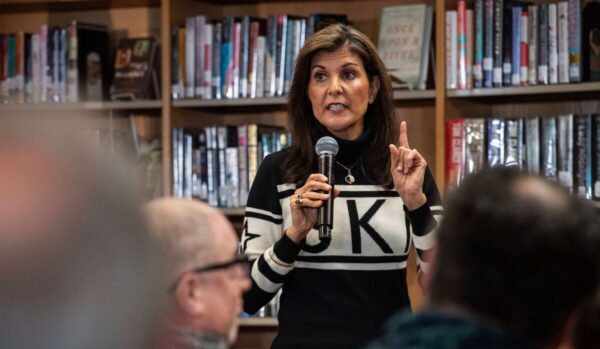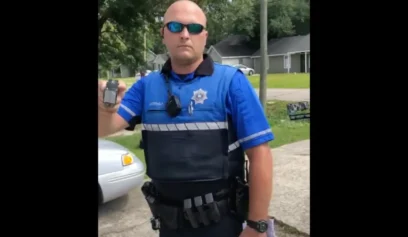Republican presidential hopeful Nikki Haley sparked yet another public firestorm on race this week after asserting in a recent interview that she faced racial discrimination in her early life “as a brown girl.”
Haley, whose Sikh parents immigrated to America from India in the 1960s, said she encountered racism throughout her childhood in South Carolina a week after she declared the United States has “never been a racist country.”
“We were the only Indian family in our small Southern town,” Haley told NBC on Sunday. “I was teased every day for being brown. So, anyone that wants to question it can go back and look at what I’ve said on how hard it was to grow up in the Deep South as a brown girl.”

The comments prompted swift backlash on social media, with many voices questioning Haley’s authenticity because she looks and sounds white and accusing her of pandering by drawing parallels between her privileged upbringing and the struggles of Black people.
The controversy emerged just ahead of Tuesday’s New Hampshire primary, where Haley had closed the gap on Donald Trump in recent weeks but still needs a miracle to beat the Republican front-runner after Florida Gov. Ron DeSantis quit the race on Sunday following an embarrassing defeat in Iowa last week.
Haley sparked the newest controversy last week after placing third in the Iowa caucuses and then making an appearance on “Fox & Friends” where she repeated a previous claim that the United States has never been “a racist country.”
During the segment, host Brian Kilmeade played a clip of MSNBC commentator Joy Reid, who spoke to Haley’s identity as a woman of color and her candidacy in a party that Reid characterized as becoming more “anti-immigrant” in the Trump era.
Kilmeade then asked Haley if she considers her party “racist.”
“No, we’re not a racist country, Brian. We’ve never been a racist country. Our goal is to make sure that today is better than yesterday,” she responded. “Are we perfect? No. But our goal is to always make sure we try and be more perfect every day that we can.”
During the segment, which aired the day after Martin Luther King Jr. Day, Haley mentioned for the first time that she experienced racism during her childhood, which infuriated racial advocates and Black leaders across the country.
“Nikki Haley claiming that America has ‘never been a racist country’ just shows how out of touch conservatives are about this country,” one X user fumed on Jan. 16. “Race-based slavery wasn’t racist? Race-based segregation wasn’t racist? Denying opportunities to Black people because of their race isn’t racist?”
Former Ohio state Sen. Nina Turner, a Democrat, also chimed in: “Slavery? Indigenous genocide?Jim Crow? Black Codes? Mass incarceration? Lynching?And on and on and on. @NikkiHaley you’ve lost your damn mind.”
Haley’s camp later doubled down on the candidate’s stance, saying, “America has always had racism, but America has never been a racist country.”
Some political pundits tried to explain Haley’s stance, asserting that from the candidate’s perspective, the United States has “never been a racist country” because her non-white family had achieved the “American dream” as part of an immigrant success story that was continuing as Haley runs for president.
However, one opinion writer acknowledged that Haley was “dead wrong” for failing to acknowledge the nation’s history of institutional racism that continues to disenfranchise Black people more than 150 years after the end of slavery.
A chorus of conservative voices also skewered Haley over the comments as Haley’s former GOP campaign rivals fell in line to support Trump against Haley in the New Hampshire primary.
“I’m more *brown* than Nimarata,” said Kathy Barnette, the campaign director for politician Vivek Ramaswamy.
“She grew up in the ‘deep’ south, I grew up in the *deeper* south in Southern Alabama on a pig farm in a house with no insulation, no running water, an out house in the back, and a well on the side… … and I was NEVER teased EVERY day for being black. This is race baiting. This is ‘playing’ the race card.”
In contrast, Haley’s parents both held doctoral degrees and led successful careers in law and academia while running a successful merchandising business after retirement.
Barnette called Haley “despicable” for trying to compare her experience to the institutional racism that Black people have endured since long before the Civil War.
“And my heart felt a little bit wounded for those who have actually faced and fought *real* racism,” she wrote.
Right-wing political commentator Dinesh D’Souza also challenged Haley on her comments, saying: “I came to America from Bombay, India at age 17 and have spent the past four decades in the most conservative precincts of American life. I have never once been teased for being brown, and I’m browner than Nikki Haley. So what’s going on here?”
Most people took issue specifically with Haley saying, “I was teased every day for being brown,” as summed up by conservative activist Matt Walsh, who responded simply, “No, you weren’t.”
A number of random voices also heckled Haley on social media, but especially in the comments section of the video shared by the Citizen Free Press.
“Nikki Haley is hands down the whitest brown person I have ever seen,” one user quipped. Another person stated. “When was she ever brown? She isn’t brown now. She’s whiter than Elizabeth Warren. I’m so sick of her pandering.”
During the interview, Haley also sought to perform damage control following a previous debacle at a New Hampshire town hall in late December when she refused to call out slavery as a cause of the Civil War.
Haley explained that she fumbled through her response because she believed that discussions about the Civil War inherently implied the presence of slavery without explicitly stating it.
“If I didn’t mention slavery on that day, it’s because that’s an automatic,” she said. “The Civil War has always been known about slavery.”
At the time of the episode, however, Haley attempted to explain that the Civil War was caused by government getting in the way of individual freedoms, religious liberties, and economic pursuits — leading to a scolding from the audience member who asked Haley, “What was the cause of the United States’ Civil War?”
“In the year 2023, it’s astonishing to me that you answer that question without mentioning the word ‘slavery,’” the man said.
Racial controversies have been a recurring theme throughout Haley’s public service career.
In 2020, she gave a speech before the Republican National Convention, saying America is not racist as protests gripped the country in the months following the police killing of George Floyd.
“My father wore a turban. My mother wore a sari,” she said at the time. “We faced discrimination and hardship, but my parents never gave into grievance and hate.”
“It’s now fashionable to say that America is racist. That is a lie,” said Haley, who removed the Confederate flag from South Carolina’s statehouse as governor. “America is not a racist country.”
Questions about the Civil War’s legacy also remain significant in Haley’s home state of South Carolina, where she’s faced scrutiny on the topic in the past.
Back in 2010, during her gubernatorial campaign, she characterized the Civil War as a clash between two sides — one advocating for “tradition” and the other for “change.”
The same year, she also stirred controversy when she said the Confederate flag, which is widely seen as a symbol of racism, was “not something that is” inherently racist and initially expressed support for keeping the flag above the state Capitol.
Five years later, however, Haley called for the removal of the Confederate flag following the 2015 massacre of nine Black Charleston churchgoers by a 21-year-old white supremacist.


